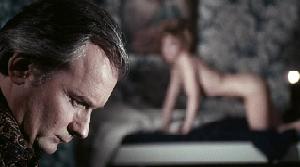
Just Before Nightfall (Claude Chabrol, 1971)
French Title: Juste avant la nuit
It was exactly like a dream, an erotic one. Advertising executive Charles Masson (Michel Bouquet) sitting and pondering with a naked blond woman inviting him to bed "Come and play... or I'll make you pay." The woman successfully seduces Charles to bed wherein they exchange sexual advances. The woman is Laura (Anna Douking), the wife of Charles' best friend Francois (François Périer). Charles is also married to Helene (Stéphane Audran) and has two children with her. We didn't know such complexities of that sexually tense initial encounter when we see it; the same way we didn't know that the encounter will end with Charles putting his hands upon Laura's neck; successfully killing her. The dream has turned into a nightmare, a nightmare that will haunt Charles.
Just Before Nightfall may be informally divided into two halves. The first half concerns Charles' efforts in evading the moral dissolve post-murder. Guilt will slowly grip Charles' psyche as a sense of safety from punishment is assured. Just minutes after the murder, he enters a bar to drown his stress and guilt. Although the murder might still be undiscovered, Charles acts as if he's already hunted --- he vomits minutes after in a sense of trying to withdraw the initial shock of his actions. Thereafter, he wears sunglasses inside the common darkness of a Parisian pub. Coincidentally, Laura's husband Francois is also there; sees the person beneath the sunglasses; invites him to a drink and a ride home (despite Charles' upper middle class stature in French society, he denies himself the luxury of having his own transport). He goes home to his family and struggles to contain his knowledge through the night. The morning papers brought the news; that Laura has been murdered. The formalities of death involves Charles and his family since Francois is a dear friend. Despite all the possible linkages of Charles to Laura's death, a connection is proven impossible and it seems that Charles has escaped criminal justice.
The second half involves the shift from evasion from justice to evasion from the corruption of knowing that one has committed a moral wrong and has successfully evaded its societal consequences. A late night nervous breakdown forces Charles to a vacation wherein he tells his wife the entire story. The remarkable twist here is that while we witness Charles deteriorate with guilt, the focal murder is exposed to be merely accidental and not an act of moral depravity; a mere aftereffect of an act of sexual perversion. It's a point of rationalization for his wife to maintain the status quo, a fulcrum in Charles' determination of his moral dilemma (he suddenly feels that he might've wanted to kill Laura; just to logically explain his guilt), a sudden shift for the audience to rethink Charles' methods.
Charles' revelation proves to be merely a temporary cure to his moral dissolve; he suddenly holds affinity to criminals (an accountant at work swindles money from the company coffers to escape with his mistress --- this sideplot is a further complication to the natural occurrence of guilt and how it is almost an act of fate that gestures will often bring a criminal to justice); his revelations (later to his friend) result in complacency (not even forgiveness which should be preluded by an acknowledgment of the wrongdoing) which further deepens the moral scar that Charles harbors ever since the murder.
Just Before Nightfall is a carefully structured psychological drama. Claude Chabrol further dissects middle class society by placing one at the mercy of his guilt; that same guilt later places the people around him (his wife, his friend, probably his mother and children) in a test of moral ambiguity. Their reactions prove to be dissatisfying, at least to the perpetrator who has broken the lines of social class by pasting his mindset alongside that of the outcasts of civil society --- the criminals and the victims of a socially imposed moral structure. Is class structure, that innate reaction to protect the status quo (an always recurring question when Charles opts to bring himself to justice is: what will happen to the children; how will your mother react; what will happen to us?) a viable reason to separate from traditions of justice? Chabrol further blurs these questions by insensitively making the victim an active seducer, who might've called the tragedy to herself.
0 comments:
Post a Comment